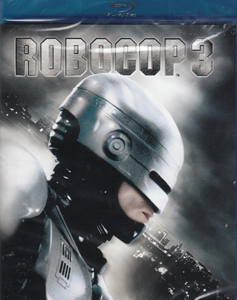For the second-straight sequel, the “RoboCop” franchise shows it’s impossible for others to re-create the specific flavor of satire mastered by Verhoeven, Neumeier and Miner. Then again, “RoboCop 3” (1993) isn’t trying to do this. And after “RoboCop 2” mixed the sensibilities of director Irvin Kershner and writer Frank Miller, with results that pleased neither, “RoboCop 3” is exactly what you’d expect a mix of Miller and “The Monster Squad’s” Fred Dekker (director and co-writer) to be.
‘RoboCop’ is now safe for kids, even if Detroit isn’t
The bad things about “RoboCop 3” are well-documented, all of it relating to the PG-13 instead of R rating. RoboCop/Alex Murphy (Robert John Burke, taking over for Peter Weller) kills bad guys, but we generally don’t see it. For example, he notes that he detects three enemies, he shoots, we hear a scream, and he notes that now there are two enemies.
This is a wink at action-film violence but also a step away from it, part of the series handlers’ attempt to draw young viewers (a mission long since undertaken by the cartoon and toy line). Ironically, there’s an impersonal cynicism to this violence, a contrast to Verhoeven’s absurdist satire and the first sequel’s mean-spiritedness. It might sound crazy, but among the trilogy, the first film has the least disturbing violence because it’s so over the top.

“RoboCop 3” (1993)
Director: Fred Dekker
Writers: Frank Miller (screenplay, story), Fred Dekker (screenplay)
Stars: Robert John Burke, Nancy Allen, Jill Hennessy
This week, RFMC’s looks at the films and TV shows of the “RoboCop” saga.
This screenplay still has too much stuff in it – notably, OCP’s Japanese partners bring in metal martial-arts assassins (the development of which is totally unexplained) – but it is tighter than “RoboCop 2’s.” With a plot about OCP (which owns the city) razing poor Detroit neighborhoods in order to build Delta City, “RoboCop 3’s” conflict pits a literally underground resistance against OCP.
There’s an ED-209-loving kid (Remy Ryan’s Nikko) in “RoboCop 3” because executives thought kids needed an audience surrogate. She escaped to the underground, but her parents were killed “trying to escape.” (And what was their crime anyway?) OCP promises wonderful new lives in Delta City, but the corporation – whose flag uses Nazi colors in “RoboCop 2” – basically disappears poor people.
Because this not shown clearly, the film gets away with an uncomfortable parallel to Nazi concentration camps, but also softens its satire. “Star Wars: Episode I” would repeat this careful dance six years later in its mostly off-screen storyline of the Trade Federation rounding up the citizens of Naboo and leaving a “catastrophic” death toll.
Holding its fire
The trend of pulling its punches on good satire runs throughout “RoboCop 3,” but it also has something going for it. Casting director Steven Jacobs is the MVP, as he compiles respectable new RoboCop actor Burke, plus a slew of future-star newcomers. At OCP, we have Rip Torn, John Castle, Bradley Whitford and Jill Hennessy (RoboCop’s scientist ally on the inside). Among the resistance fighters are CCH Pounder, Stephen Root and Daniel von Bargen.

“RoboCop 3” is in a constant state of push and pull, as the actors elevate the material as high as it can go, but the mission statement of appealing to all ages quashes any chance of greatness. The action scenarios – RoboCop flying with a jetpack, and fighting the metal ninjas – are stupid, but the general conflict of developers versus residents is timeless and features satirical gags spinning off from it.
These gags – like a wrecking ball smashing through a house right as a dad tucks his kid into bed, assuring her this is her home and she’s safe here – would be great except that we can’t help but compare them to the idiosyncratic flavor of Verhoeven. In comparison, “RoboCop 3’s” satire seems generic.
“RoboCop 3” is “mission accomplished,” like “Mad Max Beyond Thunderdome” before it: The saga is now safe for kids. The tamer approach certainly hurts it. But to be fair, “RoboCop 3” is more focused than “RoboCop 2” and less stupid than your average franchise cash-in.

